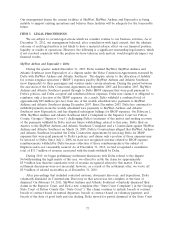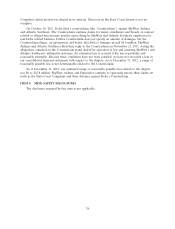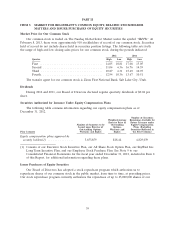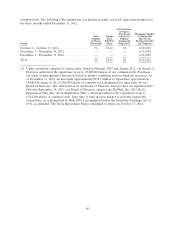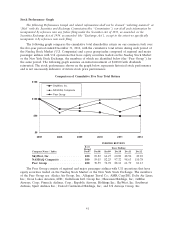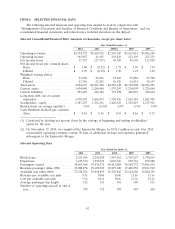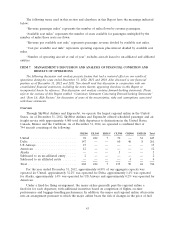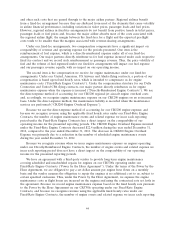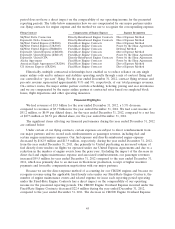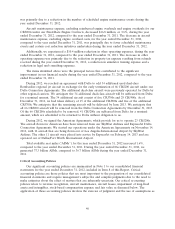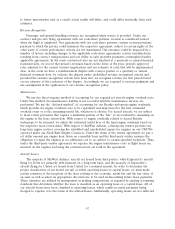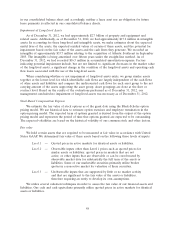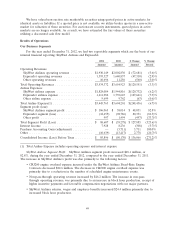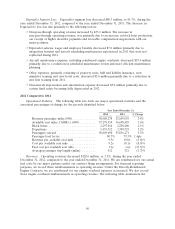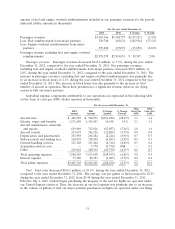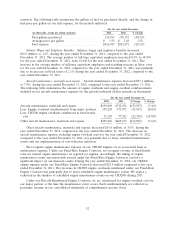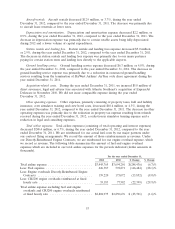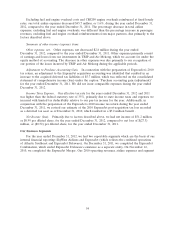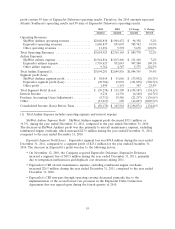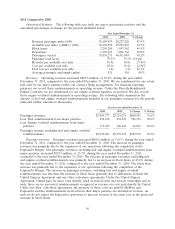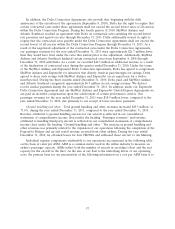SkyWest Airlines 2012 Annual Report Download - page 51
Download and view the complete annual report
Please find page 51 of the 2012 SkyWest Airlines annual report below. You can navigate through the pages in the report by either clicking on the pages listed below, or by using the keyword search tool below to find specific information within the annual report.to future uncertainties and, as a result, actual results will differ, and could differ materially from such
estimates.
Revenue Recognition
Passenger and ground handling revenues are recognized when service is provided. Under our
contract and pro-rate flying agreements with our code-share partners, revenue is considered earned
when the flight is completed. Our agreements with our code-share partners contain certain provisions
pursuant to which the parties could terminate the respective agreement, subject to certain rights of the
other party, if certain performance criteria are not maintained. Our revenues could be impacted by a
number of factors, including changes to the applicable code-share agreements, contract modifications
resulting from contract renegotiations and our ability to earn incentive payments contemplated under
applicable agreements. In the event contracted rates are not finalized at a quarterly or annual financial
statement date, we record that period’s revenues based on the lower of the prior period’s approved
rates adjusted for the current contract negotiations and our estimate of rates that will be implemented.
Also, in the event we have a reimbursement dispute with a major partner at a quarterly or annual
financial statement date, we evaluate the dispute under established revenue recognition criteria and,
provided the revenue recognition criteria have been met, we recognize revenue for that period based
on our estimate of the resolution of the dispute. Accordingly, we are required to exercise judgment and
use assumptions in the application of our revenue recognition policy.
Maintenance
We use the direct-expense method of accounting for our regional jet aircraft engine overhaul costs.
Under this method, the maintenance liability is not recorded until the maintenance services are
performed. We use the ‘‘deferral method’’ of accounting for our Brasilia turboprop engine overhauls,
which provides for engine overhaul costs to be capitalized and depreciated to the next estimated
overhaul event or to the remaining useful life, whichever is shorter. For leased aircraft, we are subject
to lease return provisions that require a minimum portion of the ‘‘life’’ of an overhaul be remaining on
the engine at the lease return date. With respect to engine overhauls related to leased Brasilia
turboprops to be returned, we adjust the estimated useful lives of the final engine overhauls based on
the respective lease return dates. With respect to SkyWest Airlines, a third-party vendor provides our
long-term engine services covering the scheduled and unscheduled repairs for engines on our CRJ700s
operated under our Fixed-Rate Engine Contracts. Under the terms of the vendor agreement, we pay a
set dollar amount per engine hour flown on a monthly basis and the third-party vendor assumes the
obligation to repair the engines at no additional cost to us, subject to certain specified exclusions. Thus,
under the third-party vendor agreement, we expense the engine maintenance costs as flight hours are
incurred on the engines and using the contractual rate set forth in the agreement.
Aircraft Leases
The majority of SkyWest Airlines’ aircraft are leased from third parties, while ExpressJet’s aircraft
flying for Delta are primarily debt-financed on a long-term basis, and the majority of ExpressJet’s
aircraft flying for United are leased from United for a nominal amount. In order to determine the
proper classification of our leased aircraft as either operating leases or capital leases, we must make
certain estimates at the inception of the lease relating to the economic useful life and the fair value of
an asset as well as select an appropriate discount rate to be used in discounting future lease payments.
These estimates are utilized by management in making computations as required by existing accounting
standards that determine whether the lease is classified as an operating lease or a capital lease. All of
our aircraft leases have been classified as operating leases, which results in rental payments being
charged to expense over the terms of the related leases. Additionally, operating leases are not reflected
47


